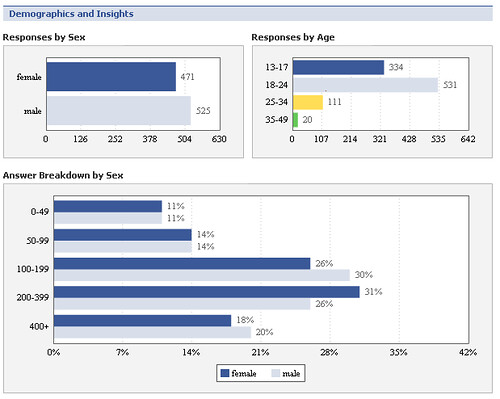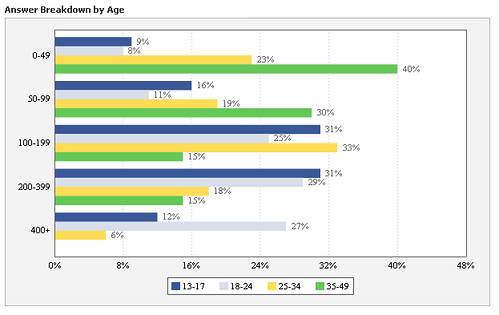One of Facebook‘s new features is the ability to create surveys, targeted to certain groups of people within the community site. One caught my eye today, which asked 1,000 random people “How many friends do you have?”. Although I am not sure of the conditions this poll was conducted under (ie, did only Australian’s see it?), 1,000 random people should theoretically be a fairly representative sample of the entire population.
Whilst the results immediately show some interesting information on the typical size of a person’s network (which is a discussion in itself), I am equally fascinated by the specific genders and age breakdown of people who answered the poll and the correlation with their network size. One theory I have of why people spend so much time on the site, is because people ‘collect’ friends. They are constantly discovering old friends through mutual friends – a friend’s list leads a person to another profile where they may discover someone they have lost touch with. Check the results first, before I continue:
Some of my interpretations of the results
- Despite being open to anyone since late last year, university students still dominate the site as over half the survey was answered by people in the 18-24 age bracket
- About 46% of males and 49% of females have over 200+ people. It’s impossible to have 200 ‘friends’ – no one can physically see 200 friends on a regular basis This tells me Facebook is now more about ‘contacts’ and keeping in touch with people you know. This makes it more than just a closed network of your close friends and more of a networking tool – validating what some commentators have been saying of late. I could spend a whole blog post explaining the implications of this, but basically, this means facebook is ‘the’ social networking site now and it’s only going to get more entrenched due to the law of cumulative advantage.
- Of people aged 35 and above, 70% have under 99 friends – which is only the case of 41% of people aged 25-34, and 19% of 18-24. This is interesting, because the people in the 24+ age group didn’t have facebook when they were at university (which is why 18-24 is so dominant in this regard). Over time, you would expect the age groups to be fairly synchronised – in fact older people would have much larger networks. This tells me despite all the hype, Facebook is still not mainstream – there is a heck of a lot more growth to occur.
- …and leading off where I started the blog posting: the fact that more males answered the poll (53%) – despite women generally outnumbering men in Western countries – implies men are more interested in knowing how many friends people have. So if you tie that with my ‘friend collector’ theory means more men spend time ‘collecting’…in other words, men stalk more!



